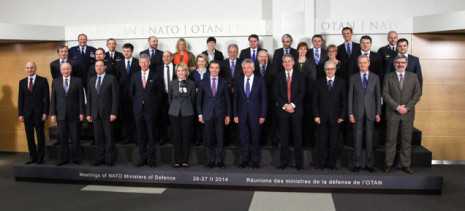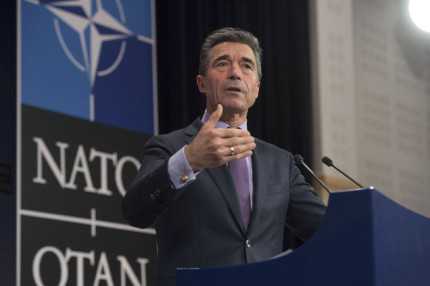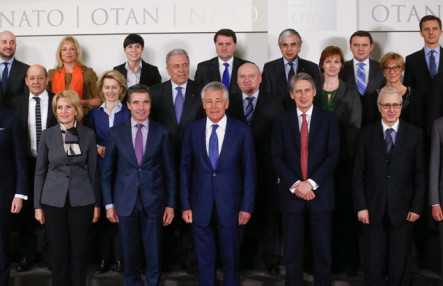Ukraine Is the Most Important Security Issue in Europe
Szöveg: honvedelem.hu/MTI | 2014. február 27. 12:45The situation in Ukraine and the development of the North Atlantic Alliance’s defence capabilities were top of the agenda at the meeting of NATO Ministers of Defence on Wednesday, February 26, as was revealed at a press conference held by NATO Secretary General Anders Fogh Rasmussen following the discussions.

NATO Defence Ministers in Belgium
The Secretary General stated that “Ukraine is the most important security issue in Europe today". He repeated almost word for word the statement approved by Ministers of Defence in the afternoon, in which, among others, NATO stresses the importance of respect for minority rights. Furthermore, it calls on all parties in Ukraine to engage in “an inclusive political process based on respect for democratic values, human rights, minorities and the rule of law, which fulfils the democratic aspirations of the entire Ukrainian people". The statement says that “NATO stands ready to continue to engage with Ukraine and assist with the implementation of reforms", and at the same time, it is pleased to see that the Ukrainian armed forces do not intervene in the political crisis.
Rasmussen also told the press that Russia had informed NATO of the troop movements and military exercise conducted near Ukraine. He also spoke about the need to finalize, until the Wales Summit in September, the list of capabilities to be developed. As he said, “through our operations, including Libya and Afghanistan, we have identified the areas where our capabilities do not go far enough or too few countries have them." NATO has managed to narrow down to seven the number of capabilities that are to be developed, currently missing or inadequate.

NATO Secretary General Anders Fogh Rasmussen
Following the meeting, Minister of Defence Csaba Hende told Hungarian News Agency MTI that of all these, Hungary is directly involved in the development of joint intelligence, surveillance and reconnaissance capabilities and the training of medical personnel. He noted that NATO’s current cyber defence concept need revision, and that NATO’s cyber defence policy must be strengthened. At the Wales Summit, the heads of member states should state that cyber attacks also belong to the context of collective defence, and that in case of a cyber attack Article 5 of the Washington Treaty can be invoked, which says that an armed attack against any of the member states shall be considered an attack against the entire alliance, and the members can take such action as they deem necessary, including the use of armed force as well, not only cyber attacks, the Minister stated.
Talking about the capabilities to be developed, Rasmussen mentioned as “flagship areas" the precision guided munitions and the training of experts who interpret intelligence data. He also pointed out that NATO has to make sure that it “is and remains ready and able to face the challenges of the future"; thus, for example, it should make further progress in the field of missile defence, and he talked about the need to develop maritime capabilities as well.

Csaba Hende: NATO’s cyber defence policy needs to be strengthened
The NATO Secretary General also emphasized the need to maintain the capability of interoperability among member states, which has been built up over the last decades. “That can only come with constant practice", Mr. Rasmussen said, adding that “that is why we will make the Connected Forces Initiative, which is designed to provide that practice, a central part of the Wales Summit" in September.
With regard to this, Csaba Hende told MTI after the discussions that maintaining this capability in peacetime requires the conduct of large-scale exercises. He also noted that the Visegrád Four countries would combine the validation exercise of the joint EU Battle Group set up by themselves with NATO’s Exercise Trident Juncture in 2015, and that in conjunction with that, Hungary would hold another exercise of its own.
Photo: AP/nato.int